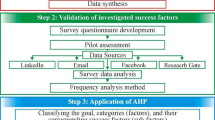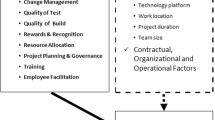Abstract
Offshore outsourcing software development (OOSD) is increasingly being used by the Software Industry. OOSD is a specific variant of Geographically Distributed Software Development (GDSD). Compared to the traditional mode of software development (i.e., in-house) GDSD is more edgy and puts at risk the attainment of the expected results. Although the failure of an offshore outsourcing software project may be caused by a variety of factors, one major complication is geographical distance. Consequently we argue that risk avoidance in outshore software development should be undertaken well in advance of the development launch. This could be done by testing the offshore outsourcing relevance of each software project and then the offshore outsourcing company involved. With this in mind we have developed the OUTSHORE Maturity Model – OMM.
Access this chapter
Tax calculation will be finalised at checkout
Purchases are for personal use only
Similar content being viewed by others
References
Amberg M, Wiener M (2005) Kritische Erfolgsfaktoren für Offshore Softwareentwicklungsprojekte – eine explorative Studie. Friedrich-Alexander-University, Erlangen-Nürnberg.
Aubert BA, Dussault S, Patry M, Rivard S (1999) Managing the risk of IT outsourcing system sciences. Proceedings of the 32nd Annual Hawaii International Conference (HICSS) 32(7): 10–20.
Balzert H (2008) Softwaremanagement: Lehrbuch der Softwaretechnik. Spektrum Akademischer Verlag.
Betz S, Mäkiö J (2008) Applying the OUTSHORE approach for risk minimisation in offshore outsourcing of software development projects. Multikonferenz Wirtschaftsinformatik (MKWI) 2008, München, Germany.
Boehm B (1991) Software risk management: Principles and practices. Piscataway: IEEE Software, 8: 32–41.
Boehm BW (1981) Software Engineering Economics. Englewood Cliffs, NJ: Prentice-Hall Inc.
Boos E, Iealniesks J, Moczadlo R, Rohfels M, Schmidt C, Simmen J (2005) BITKOM – Leitfaden Offshoring. Bundesverband Informationswirtschaft, Telekommunikation und neue Medien e.V., Berlin.
Carmel E, Agarwal, R. (2002) The maturation of offshore sourcing of information technology work. MIS Quarterly Executive 1(2): 65–78.
Carnegie Mellon University (1995) Software Engineering Institute. A Systems Engineering Capability Maturity Model VersionSM 1.1. available on: http://www.sei.cmu.edu/pub/documents/95.reports/pdf/mm003.95.pdf. Accessed May 2008.
Carnegie Mellon University (2006) CMMI® for Development, Version 1.2, Software Engineering Institute CMMI for Development, available on: http://www.sei.cmu.edu/publications/documents/06.reports/06tr008.html. Accessed May 2008.
Carnegie Mellon University (2007) Software Engineering Institute. CMMI® for Acquisition, Version 1.2 available on: http://www.sei.cmu.edu/publications/documents/07.reports/07tr017.html. Accessed May 2008.
Casey V, Richardson I (2006) Uncovering the reality within virtual software teams. Workshop on Global Software Development for the Practitioner, Shanghai, China, pp. 66–72.
Cataldo M, Herbsleb, JD (2008) Communication patterns in geographically distributed software development and engineers’ contributions to the development effort. Proceedings of the 2008 International Workshop on Co-operative and Human Aspects of Software Engineering, Leipzig, Germany, pp. 25–28.
Chrissis MB, Konrad M, Shrum S (2006) CMMI. Guidelines for Process Integration and Product Improvement. Reading, MA: Addison-Wesley.
Cooper J, Fischer M (2002) Software Aquisition Capability Maturity Model® Version 1.03., Technical Report available on: http://www.sei.cmu.edu/pub/documents/95.reports/pdf/mm003.95.pdf. Accessed May 2008.
Curtis B, Hefley WE, Miller SA (1995) People Capability Maturity Model [P-CMM]. UK: Addison-Wesley.
Curtis B, Kellner MI, Over J (1992) Process modeling. Communications of the ACM 35(9): 75–90.
Galliers R, Sutherland AR (2003) The Evolving Information Systems Strategy, 3rd edn. Oxford: Strategic Information Management, Elsevier.
Glaser B, Strauss A (1967) The discovery of Grounded Theory: Strategies of Qualitative Research. New York: Aldine.
Gold T (2005) Outsourcing Software Development – Making it Work. Boca Raton, FL: Auerbach Publications.
Greiner LE (1972) Evolution and revolution as organizations grow. Harvard Business Review 50(4): 37–46.
Herbsleb J, Mockus A, Finholt T, Grinter R (2000) Distance, dependencies, and delay in a global collaboration. Proceedings of the 2000 ACM Conference on Computer Supported Co-operative Work, pp. 319–328.
Herbsleb J, Zubrow D, Goldenson D, Hayes W, Paulk M. (1997) Software quality and the capability maturity model. Communications of the ACM 40(6): 30–40.
Herbsleb JD, Moitra D (2001) Global software development. IEEE Software, March/April 18(2): 16–20.
Humphrey WS (1989), Managing the Software Process. Reading, MA: Addison-Wesley.
Kraut RE, Streeter LA (1995) Co-ordination in large scale software development. Communications of the ACM 38(7): 69–81.
Lientz B, Larssen L (2006) Risk Management for IT-Projects: How to Deal with over 150 Issues and Risks. Oxford: Elsevier.
McCarthy J, Ferrusi Ross C, Schwaber CE (2003) Users’ Offshore Evolution and Its Governance Impact. Forrester Research, December.
Mezak S (2006) Software Without Borders – A Step-by-Step Guide to Outsourcing Your Software Development. Los Altos, CA: Earthrise Press.
Moczadlo R (2005) Chancen und Risiken des offshore-Development – Empirische Analyse der Erfahrungen deutscher Unternehmen, Germany, available on: http://www.competencesite.de/offshore.nsf/8FB68EAB823EF285C1256D72005BBCD1/$File/studie_offshore_prof_moczadlo.pdf.
Morales AW (2004) Outshore by Numbers, available on: http://www.ddj.com/architect/184415074.
Paasivaara M, Lassenius C (2004) Collaboration practices in global inter-organizational software development projects. Software Process: Improvement and Practice 8(4): 183–199.
Pierce R, Tilley S (2002) Automatically connecting documentation to code with rose. Proceedings of the 20th Annual International Conference on Systems Documentation, ACM Press, New York, pp. 157–163.
Ramesh G (2007) Managing Global Software Projects. New Delhi: Tata McGraw-Hill Publishing Company Limited.
Salma B, Lyes K, Abderrahman E, Younes B (2007) Quality risk in outsourcing. Proceedings of International Conference on Service Systems and Service Management, pp. 1–4.
Schaaf J, Weber M (2005) Offshoring-Report 2005: Ready for Take-off, Economics – Digitale Ökonomie und struktureller Wandel, 52, Deutsche Bank Research.
Sommerville I (2006) Software Engineering: Update. Amsterdam: Addison-Wesley Longman.
Tho I (2005) Managing the Risks of IT Outsourcing. Oxford: Elsevier Butterworth-Heinemann.
Weakland T (2005) DiamondCluster 2005 Global IT Outsourcing Study. Chicago, IL: DiamondCluster International, Inc.
Acknowledgements
This research was developed within the co-operation project OUTSHORE funded by the German Federal Ministry of Education and Research (bmb+f). OUTSHORE is a collaboration of the Forschungszentrum Informatik (FZI), the institute AIFB of the Universität Karlsruhe (TH) and several industrial partners. The research project has a runtime of 30 months. The goal of the OUTSHORE project is to determine the effect of risk factors on an offshore software development project. A decision model, based on these criteria, will be created for the project run-time simulation to enable risk analysis on distributed software development projects.
Author information
Authors and Affiliations
Corresponding author
Editor information
Editors and Affiliations
Rights and permissions
Copyright information
© 2010 Springer-Verlag Berlin Heidelberg
About this chapter
Cite this chapter
Mäkiö, J., Betz, S., Oberweis, A. (2010). OUTSHORE Maturity Model: Assistance for Software Offshore Outsourcing Decisions. In: Mistrík, I., Grundy, J., Hoek, A., Whitehead, J. (eds) Collaborative Software Engineering. Springer, Berlin, Heidelberg. https://doi.org/10.1007/978-3-642-10294-3_16
Download citation
DOI: https://doi.org/10.1007/978-3-642-10294-3_16
Published:
Publisher Name: Springer, Berlin, Heidelberg
Print ISBN: 978-3-642-10293-6
Online ISBN: 978-3-642-10294-3
eBook Packages: Computer ScienceComputer Science (R0)




